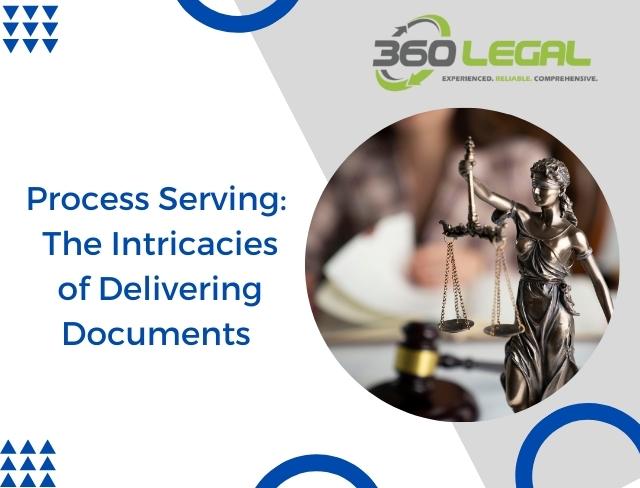Testing RSS Feeds.. ignore post.
Testing RSS Feeds.. ignore post.
Process Serving: The Intricacies of Delivering Documents

Process serving is an essential yet often overlooked aspect of the legal system. It plays a vital role in ensuring that justice is served by making sure that all parties involved in a legal matter are informed. In this article, we will explore the intricacies involved in delivering legal documents, from the role of a process server to the challenges and best practices in this field.
The Role of a Process Server
A process server is a qualified individual responsible for delivering legal documents to the people involved in a court case. These documents range from summonses, subpoenas, and complaints, to eviction notices and divorce papers. The process server ensures that the recipient is made aware of legal actions against them or actions they are required to take, ensuring that due process is upheld.
Types of Legal Documents Served
Various types of legal documents require serving, each with its own set of rules and protocols. Some of these include:
- Summons and Complaint: These documents inform a defendant that a legal action has been initiated against them and instruct them to appear in court.
- Subpoena: This commands someone to attend a legal proceeding as a witness or produce evidence.
- Eviction Notice: This informs a tenant that they must vacate a property within a specified time frame.
- Divorce Papers: These inform the spouse that a legal separation process has begun.
Challenges in Process Serving
- Locating the Recipient: Sometimes, the person to be served is hard to find, requiring the process server to conduct skip tracing.
- Refusal: Some individuals refuse to accept the documents, complicating the serving process.
- Jurisdiction: Laws around process serving can differ greatly depending on the jurisdiction, even within the same country.
- Safety Risks: Serving papers can sometimes be dangerous, especially if the recipient is volatile.
The following is a DRAMATIZATION AND NOT AN ACTUAL EVENT: Sarah, an experienced process server, is assigned to serve an eviction notice. The address leads her to a neighborhood known for its high crime rate. Sarah takes necessary precautions, including informing her office about her location and expected time of return. Upon reaching the location, she finds out that the tenant has a hostile demeanor. Nonetheless, applying her training, Sarah maintains a professional composure, successfully serving the eviction notice.
Best Practices in Process Serving
- Verification: Always confirm the identity of the person being served, usually through photo identification.
- Documentation: Maintain meticulous records, including the date, time, and manner of service.
- Ethical Considerations: Always operate within the bounds of the law and ethical guidelines.
- Training and Professionalism: Continued education, professional demeanor, knowledge, and commitment to compliance with laws and procedures are essential.
The following is a DRAMATIZATION AND NOT AN ACTUAL EVENT: John, a process server, goes to serve a subpoena, confirms the recipient’s identity through an ID check, serves the documents, and notes the date and time for his records. Before leaving, he double-checks to make sure all legal protocols have been followed.
Technological Aids in Process Serving
Modern technology is easing some of the challenges in process serving. GPS can help in locating hard-to-find individuals, while digital records make documentation easier and more reliable. Some jurisdictions are also moving towards electronic serving, although this is still a matter of legal debate.
The following is a DRAMATIZATION AND NOT AN ACTUAL EVENT: Mike, a tech-savvy process server, uses a specialized app to keep track of all his tasks for the day. When he faces difficulty finding a recipient, the app assists him with real-time location tracking. Once the service is complete, the app automatically updates his records.
Legal Reforms and Future Trends
In recent years, there has been a push for legal reforms to standardize process serving across jurisdictions. This would involve comprehensive training programs, stricter regulations, and technological adaptations to make the system more robust.
Importance of Timing in Process Serving
The adage “Time is of the essence” holds especially true in the realm of process serving. Meeting specific deadlines for serving documents is not only a mark of professionalism but also a legal necessity in many cases. Courts often have stringent timelines within which parties must be notified of proceedings or actions against them. Failing to meet these deadlines can result in delays, additional costs, or even the dismissal of a case.
Why Timing Matters
- Legal Compliance: Courts set specific timelines for serving documents, and missing these deadlines can jeopardize the entire legal process.
- Due Process: Timely serving ensures that the recipient has adequate time to respond or take necessary actions, safeguarding the principles of due process.
- Case Progression: Delays in process serving can lead to a slowdown in the case’s progression, affecting all parties involved and burdening the judicial system.
Strategies to Ensure Timely Service
- Advanced Planning: Before attempting to serve, process servers should be well aware of the timeline and plan their actions accordingly.
- Technology Aids: Using scheduling software or apps can help keep track of multiple deadlines and streamline workflow.
- Collaboration: In challenging cases, process servers might work with legal professionals or even private investigators to locate elusive individuals quickly.
The following is a DRAMATIZATION AND NOT AN ACTUAL EVENT: Emily, a process server, is tasked with serving a time-sensitive summons for a high-profile case. Aware of the looming deadline, she uses her scheduling software to set reminders and allocates specific time slots to attempt service. Armed with this information, she successfully serves the documents well within the legal timeline, ensuring that due process is maintained.
By recognizing the critical role that timing plays in process serving, professionals in this field can better prepare and execute their duties, thereby upholding the integrity of the judicial system.
Conclusion
Process serving is a complex job that demands a high level of professionalism, knowledge, and sometimes even courage. Though it comes with its set of challenges, following best practices and leveraging technological aids can make the process smoother and more efficient. As legal frameworks evolve, the role of process serving remains indispensable in upholding the principles of justice and due process. It’s not just about delivering papers; it’s about being a crucial cog in the wheel of justice.
Author
We are Social!
Latest tweets
Popular Tags
Testimonials
"5 star service ! prompt serving, helpful, professional . "
"Mike is awesome. Our firm has hired him on several occasions and we are very happy with his work. His prompt serving, helpful, professional and always in communication. I recommend him highly! "
"360Legal provides speedy and easy to use Process Service that is flexible, and very transparent with nearly instant reporting. It is very helpful for us to be able to track the status of our process service jobs, especially when they are time sensitive. "
Latest News
-

RMAI 2021 Annual Conference RMAI Annual Conference
April 12-15, 2021 -

NATIONAL CREDITORS BAR ASSOCIATION 2020 SPRING CONFERENCE
May 19-21, 2021 -

ALFN ANSWERS 2021
Jul 18-21, 2021 -

Annual Convention and Expo
Oct. 17-21, 2021 -

Florida Association of Professional Process Servers 33rd Quarter Board Meeting/Professional Beach Getaway
Aug. 20-22, 2021












